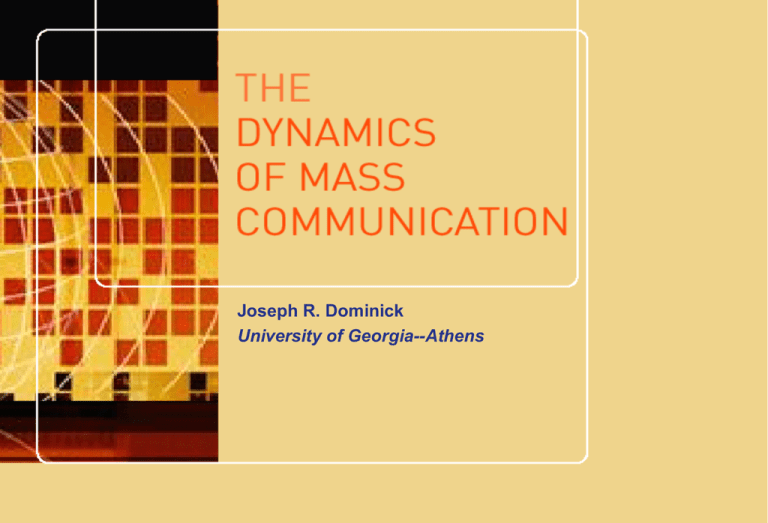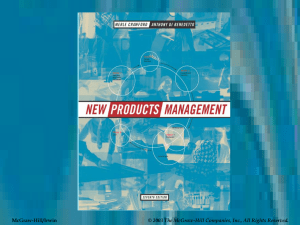
Slide 1
Joseph R. Dominick
University of Georgia--Athens
© 2005 The McGraw-Hill Companies, Inc. All rights reserved.
Slide 2
Part III
Specific Media
Professions
© 2005 The McGraw-Hill Companies, Inc. All rights reserved.
Slide 3
Chapter 13
Chapter Outline
Public Relations
Case Study – Qorvis and Saudi Arabia
Defining Public Relations
A Short History of Public Relations
Organization of the Public Relations Industry
Departments and Staff
The Public Relations Program
Economics
PR Online
Public Relations Careers
© 2005 The McGraw-Hill Companies, Inc. All rights reserved.
Slide 4
Case Study – Qorvis and Saudi Arabia
Saudi Arabia home to 15 of 19 attackers on 9/11
Saudi Arabia hired Qorvis for spin control
$200,000/month retainer
$20M ad campaign: TV, radio, print
Interviews of Saudi diplomat Adel Al-Jubeir
Result? American opinion worsened
Attention brought out other negative stories
© 2005 The McGraw-Hill Companies, Inc. All rights reserved.
Slide 5
Defining Public Relations
Public relations is the art and social science of
analyzing trends, predicting their
consequences, counseling organization
leaders, and implementing planned programs
of action which serve both the organization’s
and the public’s interests.
--- World Assembly of Public Relations
© 2005 The McGraw-Hill Companies, Inc. All rights reserved.
Slide 6
Defining Public Relations
PR compared with Advertising
Both persuade
Both use mass media
Advertising is a marketing function
Public relations is a management function
Advertising does not use interpersonal communication
Public relations uses every communication form
Advertising is sponsored (paid for)
Public relations messages are usually free
© 2005 The McGraw-Hill Companies, Inc. All rights reserved.
Slide 7
Defining Public Relations
Common practices that are not public relations:
Press agentry
– staging media events to attract public attention
Publicity
– attempting to place favorable stories in the media
Extensive publicity and bad public relations???
It’s possible!
© 2005 The McGraw-Hill Companies, Inc. All rights reserved.
Slide 8
Defining Public Relations
What PR people actually do:
Work with public opinion
Explain their organization to various publics
Listen to the publics
Work with top management to achieve goals
© 2005 The McGraw-Hill Companies, Inc. All rights reserved.
Slide 9
A Short History of Public Relations
American Revolution
Boston Tea Party
Liberty Tree
Samuel Adams, Thomas Paine, Abigail Adams,
Benjamin Franklin
Industrial Revolution
Initially public completely disregarded
Muckraking exposés
Prototypical press agents
© 2005 The McGraw-Hill Companies, Inc. All rights reserved.
Slide 10
A Short History of Public Relations
Ivy Lee
Press representative for anthracite coal
mine operators and Pennsylvania RR
(late 1900s)
Declaration of Principles
The “humanizing” of business
Woodrow Wilson’s Creel Committee
PR tactics in WW I
“Save food”; “Buy war bonds”
© 2005 The McGraw-Hill Companies, Inc. All rights reserved.
Slide 11
A Short History of Public Relations
Edward Bernays, Crystallizing Public Opinion,
first book on public relations (1923)
Carl Byoir opens PR agency (1930)
Franklin Roosevelt’s radio “fireside talks”
Depression
New Deal reform program
WW II – creation of Office of War Information
© 2005 The McGraw-Hill Companies, Inc. All rights reserved.
Slide 12
A Short History of Public Relations
Growth in Public Relations late 20th Century
Some companies acknowledge social responsibilities
Consumerism forces organizations to pay attention
Organizational complexity necessitates PR department
Public is more complex
Population growth
Workplace specialization
Job mobility
© 2005 The McGraw-Hill Companies, Inc. All rights reserved.
Slide 13
A Short History of Public Relations
Public Relations late 20th Century
“Era of Public Relations”
19,000 (1950) 300,000 (2003)
Public Relations Society of America (1947)
Code of Standards (1954)
Public Relations Student Society of America (1967)
US military operations in Iraq and embedded reporters
Enron, Arthur Anderson
One of fastest growing professions in USA
© 2005 The McGraw-Hill Companies, Inc. All rights reserved.
Slide 14
Organization of the Public Relations
Industry
Internal PR Department
More in-depth knowledge about the company
Assigned or reassigned on short notice
Less costly
External PR Agencies
Fresh, objective viewpoints
More services
Purchasable prestige
May cause morale problems in company
© 2005 The McGraw-Hill Companies, Inc. All rights reserved.
Slide 15
Organization of the Public Relations
Industry
Areas of Public Relations Practice
Business
Entertainment and sports
Government
International PR
Education
Investor relations
Hospitals
Politics
Nonprofit organizations
Crisis management
Professional associations
© 2005 The McGraw-Hill Companies, Inc. All rights reserved.
Slide 16
Departments and Staff
Internal PR Departments
No two are identical
PR director always reports directly to top
management
Three main divisions
1) Corporate communications (internal publics)
2) Community relations (external publics)
3) Press relations (news media)
© 2005 The McGraw-Hill Companies, Inc. All rights reserved.
Slide 17
Departments and Staff
External PR Departments
More complex
Five typical main divisions
1)
2)
3)
4)
5)
Creative services – press releases
Research – surveys, focus groups
Publicity and marketing – merchandising, promotions
Accounts – relations with clients
Administration – business aspects of the department
© 2005 The McGraw-Hill Companies, Inc. All rights reserved.
Slide 18
The Public Relations Program
The Four Steps of a Typical PR Program
Step
Step
StepThree
Four
One
Two
Evaluation
Communication
Planning
Example:
An
automobile
manufacturing
plant
is
Information
Gathering
How
much
will
the
company
save?
“How
well
did
it
work?”
Organization
is the source of the communication
Strategic
closing
soon
ingeneral
Cartown,
Midwest
USAmedia
Works
with
MBO
techniques
– measurable
goals
Organizational
records,
books,
journals
Long
term,
goals
How
many
workers
will
be
transferred?
PR
requires
thorough
knowledge
of mass
make
measurement
of success possible
Formed
by
top
management
Letters,
email,
interviews
Challenge:
Communicate
this
to thealso
people
of
Personal
communication
channels
necessary
What
about
the
empty
buildings?
Measure
Tacticalaccomplishment of tasks as well as
Formal
research
techniques
Cartown
Example:
news
conferences,
ads, news releases,
achievement
of
desired
effect
More
specific,
often
short
term
Will the people believe the company?
public
meetings
(external
publics)
Program-specific
questions:
Tasks
that achieve
the #strategic
goalsdelivered
Simple
measurements:
brochures
How
will
affect
the
company’s
other
operations?
Example:
bulletin
boards,
newsletters,
speeches,
Management by Objective
Complex measurements: shift of perception
letters,
memos
(internal
publics)
“Inform
>50%
of
Cartown
about
reasons
fortomove”
Example: Change in customer
loyalty
due
move
© 2005 The McGraw-Hill Companies, Inc. All rights reserved.
Slide 19
Economics
$ Weak economy revenues decline 2001+
$ Top 50 USA PR firms: $2B in fee income in 2002
$ Industry domination: giants owned by ad agencies
$ (Porter-Novelli, Fleishman-Hillard) of Omnicom
$ (Hill & Knowlton, Burson-Marsteller) of WPP
$ Independents
$ Edelman PR Worldwide
$ Ruder Finn
$ Fees: fixed, retainer, hourly rate, time+
© 2005 The McGraw-Hill Companies, Inc. All rights reserved.
Slide 20
PR Online
Email used for press releases and communications
Internet used to distribute info to the media
PR Newswire
Corporate website now first line of communication
with: consumers, shareholders, reporters
Crisis management uses corporate website
Example: www.saudinf.com
Online corporate pressroom
© 2005 The McGraw-Hill Companies, Inc. All rights reserved.
Slide 21
Public Relations Careers
Internships at various firms, or in the media
Writing and communication skills very
important
Business, law, public opinion research, social
sciences are useful
Editing, writing, speech-making, media
production
© 2005 The McGraw-Hill Companies, Inc. All rights reserved.






